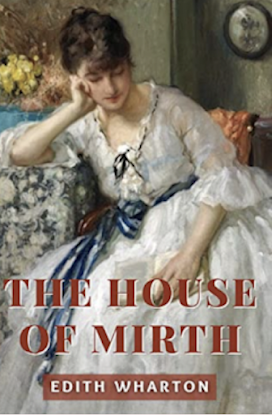Length: 236 pages
My Rating: ⭐⭐⭐⭐☆
This was my second book for the Classics Club and also one of my January Historical Fiction Reading Challenge choices. I've had it in my Kindle forever and always wanted to tackle it. I sort of have a love/hate relationship with some of the classics: when I am immersed in the story, I really love it. But when I want to just zone out and am tired I get stressed about reading them because they require so much concentration. This book was not terribly difficult but it did stretch my vocabulary and made me ponder some deep ideas about life and what is important. And that is why the classics are, well, classics!
Lily Bart is faking her way through life when we meet her at the beginning of the story. She is twenty-nine years old (a veritable Old Maid by the standards of the day) and looking desperately for a husband who can keep her styled in the manner she has become accustomed to. She is attracted to Lawrence Selden, a friend who is privy to the society she revolves in, but cannot act upon this attraction as he is not wealthy enough to suit her. While this sounds shallow and cruel, it is honest, and Lily does not pretend otherwise. She sets her sights upon the well to do Percy Gryce, despite the fact that she is not in love with him and finds him to be a tedious bore. Her desperation to continue to fund her lifestyle choices, including debts incurred from the game of bridge, cause her to ignore her feelings for Selden and nearly marry Gryce.
Just when she is set to accept a proposal from Gryce, Lily is the subject of scandalous rumors which serve to change his mind about marrying her. Adrift again and in debt, Lily begins to involve herself with the husband of her friend Judy, igniting consequences which will later prove to be disastrous. As she continues down this path she finds she is becoming persona non grata in the upper echelons of society and as she resorts to spending time with other "friends" who are further down the ladder of wealth and importance, her reputation suffers.
When an unexpected opportunity to go on a cruise with her wealthy friends arises, Lily accepts and things turn against her. She tries to redeem herself in other ways and continues to find people to support her, even a man who proposes marriage, but each time her bad decisions and vacillation between what she wants and what is possible serve to complicate her life with tragic results.
I found this story to be a bit depressing. It is well written of course, as most classics are, and the vocabulary of these writers from long ago always amazes me. Almost from the start of the book I didn't care for Lily. She seems shallow and entitled, as if the finer things are owed to her because she expects them. I can see how some of my feelings are clouded by the time and social class I live in and that the point of the story is to see how money and status are fleeting, and not something to be pursued at the expense of one's own happiness and obtained by giving your soul to the highest bidder. I guess I didn't feel sorry for her in the sense that she had opportunities for what she wanted but continued to squander them. Without giving away too much of the later part of the book, I'll just say that her downward spiral wasn't entirely surprising.
I do like the peek into the customs and expectations of the time. My great grandmother, who I knew well, was born in 1904 so right around the time this book was published. Of course she was not rich or even a city dweller but it is fun to see what life would have been like for a well bred young woman of her day. There were not a lot of options if you wanted to have a nice, carefree life. Marriage as quickly as possible to a man of means was a necessity. But when I think of my great grandmother's life in rural Texas on a farm, I think she probably was much happier and content than Lily in her aristocratic New York world.
The book could sometimes drag a bit and repeat itself, I think it could have been much shorter. But Wharton does a great job of building things slowly as to really see how Lily's circumstances deteriorate. I'm not sure if I will read another of her books anytime soon as some of the plot lines don't interest me. But I'm glad to have read this one to understand why it is so popular. It is timeless in its theme of being careful not to let materialism and societal acceptance cloud your better judgement.

I also recently read this title for my list for Classics Club! Like you, I'd had it on my to-read list for ages.
ReplyDelete"I do like the peek into the customs and expectations of the time [....] But when I think of my great grandmother's life in rural Texas on a farm, I think she probably was much happier and content than Lily in her aristocratic New York world."
This is such an interesting perspective. You've now got me thinking about my own various ancestors who would have been around during the time this story was set, and I can't think of a single one who would have had a similar life to Lily's. They all had their trials of course — the necessity of marriage possibly being one of them, as you mentioned — but nothing quite like the personal disaster described in this book.
I will have to read your review! It is fascinating to see how different ladies' lives were just a hundred years ago.
Delete